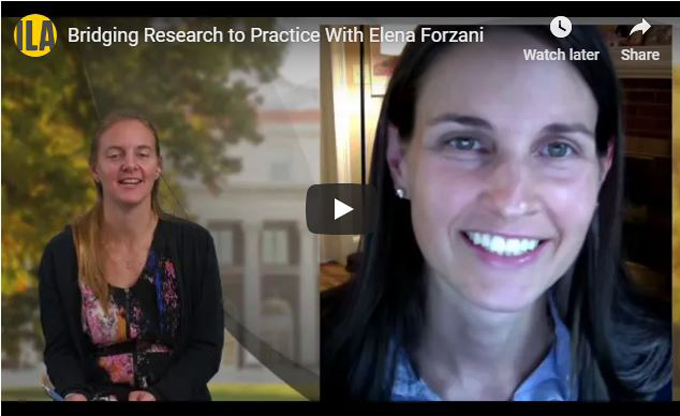 Although there are numerous resources available to help educators find new tools and strategies to use in their classrooms, translating these resources into practice is not always easy. For this reason, the editors of ILA’s Reading Research Quarterly (RRQ), Amanda Goodwin, an assistant professor in language, literacy, and culture at Vanderbilt University’s Peabody College, and Robert T. Jiménez, professor in ELL and literacy education at Vanderbilt University’s Peabody College, recently created two platforms to make new information more accessible to educators.
Although there are numerous resources available to help educators find new tools and strategies to use in their classrooms, translating these resources into practice is not always easy. For this reason, the editors of ILA’s Reading Research Quarterly (RRQ), Amanda Goodwin, an assistant professor in language, literacy, and culture at Vanderbilt University’s Peabody College, and Robert T. Jiménez, professor in ELL and literacy education at Vanderbilt University’s Peabody College, recently created two platforms to make new information more accessible to educators.
A new podcast, Bridge Research to Practice: Live With the Author, and Facebook group support ILA’s mission to deepen understandings in ways that impact research and practice.
Bridging research to practice
Launched in January, Bridge Research to Practice: Live With the Author features in-depth interviews with authors of key RRQ pieces. Literacy thought leaders dive deep into their background, how they became interested in their article topic, and their RRQ study. The interviews culminate with important takeaways as well as tangible steps that educators can take to make positive changes in their own classrooms.
Goodwin says they chose podcasts as the medium because episodes can be accessed anytime, anywhere—making them a convenient option for a time-strapped audience. As fellow educators, Goodwin and Jiménez understand that the standard school schedule allows little time for teachers to engage in professional learning. Podcasts—which can be played via smart phone, computer, or smart speakers such as Alexa—allow listeners to get personalized professional development while driving or cooking dinner.
The editors choose recent RRQ articles that present meaningful, relevant information so educators who follow the discussions can not only use the information presented by the researcher but also initiate conversations on the basis of on their own understanding. So far, they have interviewed authors on topics such as the impact of vocabulary intervention, second-language reading difficulties, and evaluating the credibility of online science information.
Goodwin says she hopes the podcast will be an effective tool to reach new audiences and “convey research findings in a real way to help make an impact in classrooms, homes, and schools.”
“[We are] making the effort to bridge research to practice,” she says.
Authors of our own experiences
Another way to encourage discussion around these research findings is through the group’s new Facebook page, open to RRQ subscribers and nonsubscribers, where the editors highlight excerpts and takeaways from recent articles to help educators better digest the information and apply it to different contexts. The editors also post outside articles, questions, and discussion starters so members of the community can deepen their knowledge as well as share new information with peers.
Goodwin describes the RRQ Facebook page as a platform for collaborative learning and conversation. Using hashtags such as #MeetTheResearchMonday, #TalkAboutItTuesday, #WhatDoYouThinkWednesday, #TheoryToPracticeThursday, #FindOutMoreFriday, the editors facilitate dialogue around important topics and encourage members to build connections, exchange ideas, and share their own experiences.
Goodwin says the space “let’s all of us be authors of our own experiences.”
A growing community
Although these new platforms have created opportunities for learning and discussion among teachers and educators, there is still room for growth. The next step is for RRQ readers and podcast listeners to bring these conversations to their schools, districts, and communities.
Spreading the word about these resources can help to further grow this community and extend the reach of research. This network is for the benefit of students everywhere because, according to Goodwin, “What’s the point if you don’t change the lives of children?”
Bailee Formon is an intern at the International Literacy Association.